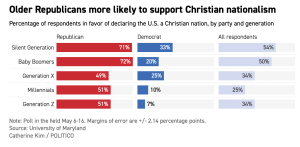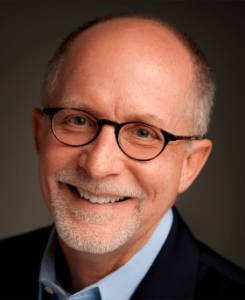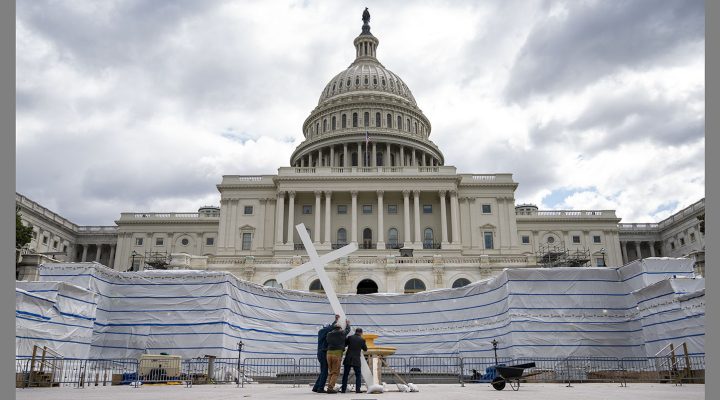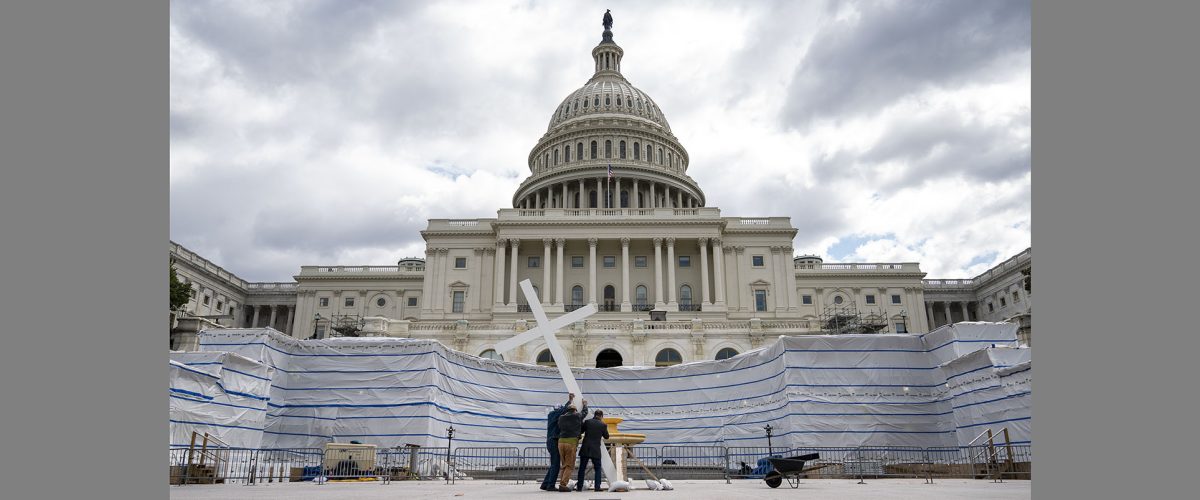A solid majority of Republicans favor declaring the United States a Christian nation, even though almost as many acknowledge the U.S. Constitution does not allow such a declaration, according to the latest Politico/University of Maryland Critical Issues Poll.
Zeal for Christian nationalism reveals such Americans (a) don’t know their history, and/or (b) don’t care how their politics impacts others’ faith, but (c) love power more than Jesus.
The poll asked a sampling of U.S. adults, “Would you favor or oppose the United States officially declaring the United States to be a Christian nation?” Republicans responded enthusiastically, with 61% in favor.

However, 57% of Republican participants said they believe the U.S. Constitution would not allow the government to declare the United States a Christian nation. So, a majority of Republicans would favor violating the Constitution in order to call their nation “Christian.”
Christian nationalist Republicans don’t stand alone, but much smaller percentages of other Americans join them. Only 17% of Democrats said they favor declaring the United States a Christian nation, while 81% of Democrats said they don’t believe the Constitution would allow the government to say the United States is a Christian nation. More broadly, 38% of survey respondents indicated they favor calling the country a Christian nation, and 70% believe the Constitution forbids it.
“Not surprisingly, much of the support for declaring the U.S. a Christian nation comes from Republicans who identify themselves as evangelical or born-again Christians.”
“Not surprisingly, much of the support for declaring the U.S. a Christian nation comes from Republicans who identify themselves as evangelical or born-again Christians: Seventy-eight percent of this group support the move, compared to 48% of other Republicans,” Politico reported. “Among Democrats, a slight majority of those identifying themselves as evangelical or born-again Christians also backed such a declaration (52%), compared to just 8% of other Democrats.”
Adherents of Christian nationalism tend to believe refabricated versions of American history, which assert the U.S founders were white Christians, evangelical in outlook, who intended the country to be Christian.
As with most lies, this one contains a kernel of truth. During the Colonial period, many white people fled Europe, mostly England, seeking religious liberty. Well, sort of.
They journeyed to the New World in quest of religious liberty — for themselves. In colony after colony, the first arrivers set up strictures requiring residents to practice religion their way, under penalty of law. The sole religious liberty outlier was Roger Williams, who established the colony of Providence in present-day Rhode Island based upon principles of absolute religious liberty for all residents.
Overcoming the prevailing intention of intoleration in the new United States a century and a half later required courage, passion and political skill. Left to their own preferences, those colonies-become-states would have perpetuated religious discrimination.
But significant leaders of the new nation knew their history. Looking back through the lens of the Enlightenment and looking ahead with aspirations for peace and harmony, they realized the marriage of church and state had fomented strife and bloodshed across Europe for centuries.
They recognized the most productive and peaceful path forward would guarantee religious liberty for all people. They acknowledged people could get along best when they reveled in freedom to follow the dictates of individual conscience. And the best way to protect individual conscience was for government to butt out of religion.
Ironically, the throngs of Baptists who beat today’s Christian nationalism drum not only don’t know U.S. history, but they also don’t know their own history.
Two years after Roger Williams chartered the colony that became Rhode Island, he founded the first Baptist church in America, in Providence. Specifically, Williams advocated for religious liberty not only for Baptists, but for people of all faiths — including Jews and Muslims — and people of no faith. He knew the only authentic faith is free faith.
Similarly, as the U.S. founders drafted and negotiated the Constitution, a Virginia Baptist pastor, John Leland, convinced James Madison to secure religious liberty as the first freedom. That’s why the first 16 words of the First Amendment state, “Congress shall make no law respecting an establishment of religion or prohibiting the free exercise thereof.”
Leland championed absolute religious liberty on practical and theological grounds. As a pastor of a minority faith in Anglican/Episcopal Virginia, he realized people who follow minority beliefs could not be free unless the Constitution guaranteed it. And as a true Baptist, he believed all people are created in God’s image and only accurately reflect that image — and reciprocate God’s love — if they are free to follow their consciences.
“Why wallow among the riffraff of other faiths and unbelievers if you’ve got the political clout to secure special status?”
Christian nationalists either don’t know this history or reject it because it’s inconvenient. Why wallow among the riffraff of other faiths and unbelievers if you’ve got the political clout to secure special status?
Ironically, these evangelical Christian nationalists — who claim to follow the Great Commission (if they can quote it) and want everyone to know Jesus and love God — don’t care how their politics affects others’ faith. And be sure that advocating for calling the United States a Christian nation is a political act.
At least two reasons stand out.
First, claiming special or exclusive status for Christianity in the United States violates the consciences of people of other faiths, as well as sincere people of no faith. Set aside theological arguments about merits of other faiths. If you say you’re evangelistic and want to convince others to follow Jesus, denigrating their beliefs and delegitimizing their faith is about the worst evangelistic approach imaginable.
Second, creation of a national church is poison for the church. Many of the same people who want the United States declared a Christian nation look with condescension on the churches of Western Europe. And, of course, most of those churches — faith atolls in secular seas — got so weak because they have been propped up by the state. The correlation is staggering and should cause Christian nationalists to repent.
“Isn’t it ironic that the same people who distrust government and who claim to want tiny or nonexistent government also want government to prop up their church?”
Also, isn’t it ironic that the same people who distrust government and who claim to want tiny or nonexistent government also want government to prop up their church? Is that hypocrisy, idolatry or laziness? All of the above.
Christian nationalists would rather ignore or subvert history rather than learn its lessons. And they belie their professed love for lost souls by taking actions that drive those souls away from the Jesus they also claim to love. So, the conclusion is clear: They love power more than they love Jesus.
Christian nationalism has nothing to do with Christianity, nor is it about a patriotic view of this nation. It’s about consolidating white power among people who claim to be Christian, and they don’t care if everybody else goes to hell.
And unless they stand against nationalistic actions, that includes 61% of Republicans and 17% of Democrats.

Marv Knox
Marv Knox founded Fellowship Southwest after editing the Baptist Standard almost 20 years. Now retired, he lives with his wife, Joanna, in Durham, N.C., where he tries to do something useful almost every day.
Related articles:
Church-state separation ‘very thin’ with Trump Republicans, Butler says on ‘Meet the Press’
Christian nationalism is a danger to our nation | Opinion by Marvin McMickle
Georgia representative says Christian nationalism actually is a good thing


